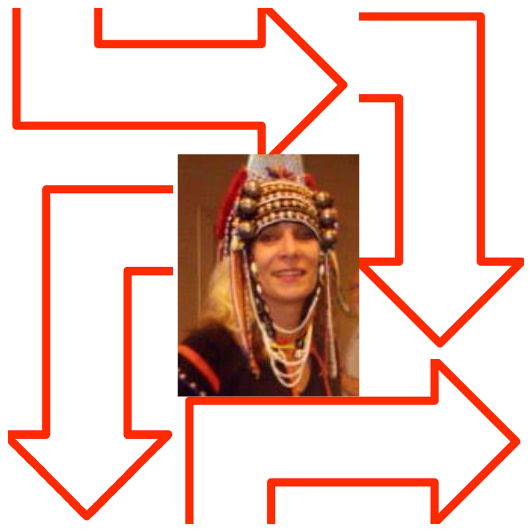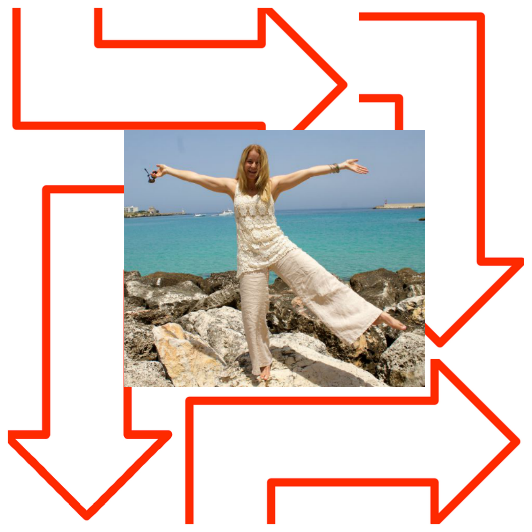
Readers, we had a long pause in this episode of the Expat Author Game, for which I heartily apologize. Christmas and New Year’s intervened, and the Displaced Nation has been hibernating during January. But it’s February now and we are back again, in time for Valentine’s Week! It seems appropriate that in this post we will be playing the second round of our Expat Author game with Apply Gidley. Her debut novel, Fireburn, is, at heart, a love story—for a man and an island.
For those who are catching up, in Round One Apple came up with a winning algorithm for Fireburn, her debut novel that takes place in the Danish West Indies in the 1870s. During this round, we’ll be trying to see how closely Apple measures up to the Displaced Nation’s (admittedly somewhat quirky) notion of an “international creative.”
On the face of it, Apple has one of the best claims we’ve ever heard to being “international.” Born to an Australian mother and a British father, she spent her childhood in Nigeria, the UK, Australia, Malaysia, and Papua New Guinea. She met her husband in Papua New Guinea, after which her travels continued as his career in oil took them all over the world. Their two children were born in the Netherlands and Thailand, and nowadays the couple calls two places home: downtown Houston and the US Virgin Islands: specifically, the island of St Croix, where the action of Fireburn takes place. Apple says she enjoys the contrast between the vibrancy of city life and the relaxed pace of the Islands.
Furthermore, I think it’s fair to call Apple “creative”. You can read about the many roles she has played on her author site, but what I’m most curious about is what caused her to don Kareni headdress in the above photo. Was she paying a visit to the hill tribes of in northern Thailand? Perhaps she’ll enlighten us in the comments.
I am also rather impressed that, although her only formal training was as a secretary (she attended secretarial college in the UK), Apple now serves on the Advisory Board of the University Museum at Texas Southern University, one of the premiere museums celebrating African American art and artifacts in Houston. One should never underestimate Ms. Gidley! No sooner has she landed somewhere but she can be found immersing herself in the local history, community and culture.
Without further ado, let’s resume the Expat Author Game and see how Apple manages Round Two, where points are scored for intangible indicators of an expansive, global outlook and the ability to take a creative approach to exploring the world.

Welcome back to the Displaced Nation, Apple. As you may know, many of our residents, myself included, have confessed that the expat life has made them feel like a character in Lewis Carroll’s Alice in Wonderland. How about you? Are there any lines from this classic work that resonate with you?
Having lived in 12 countries, relocated 26 times and now living between two places, I’d have to pick
“Who in the world am I? Ah, THAT’S the great puzzle.”
One of the joys of global mobility as an accompanying spouse is the opportunity to reinvent oneself—something I have done many times, as you mentioned in your introduction. I’ve sold diving equipment in Texas, edited a magazine for an international charity in Singapore and Thailand, sprung Brits from jail in Equatorial Guinea and decorated pubs in Aberdeen—and now I’m a writer! I have occasionally wondered which hat I am meant to be wearing at any given time.
Which leads onto the next quote:
“..it’s no use going back to yesterday, because I was a different person then.”
One of the hardest relocations is the final one—repatriation. Perhaps that why I live in two places.

Moving on to the next literature-related challenge: According to George Elliot’s Maggie Tulliver, the best reason to leave her native village of St. Ogg’s would be to see other creatures like the elephant. What’s the most exotic animal you’ve observed in its native setting?
 In South Africa, at Mala Mala, I watched a leopard prowl around the base of a tree. Her kill—an impala she had hauled up into the fork of the tree—was being eyed by a hyena lying nearby ready to pounce if any part of the mutilated antelope fell. The leopard’s strength and perseverance was humbling, as was her beauty.
In South Africa, at Mala Mala, I watched a leopard prowl around the base of a tree. Her kill—an impala she had hauled up into the fork of the tree—was being eyed by a hyena lying nearby ready to pounce if any part of the mutilated antelope fell. The leopard’s strength and perseverance was humbling, as was her beauty.

Last but not least in this series of literary challenges: We’re curious about whether you’ve had any “Wizard of Oz” moments when venturing across borders. Again, please use a quote or two. You can also pick quotes from other literary works if you like…
Saying goodbye is one of the most underrated things in a nomadic life but if we don’t say “goodbye” well, it is hard to open our hearts to saying “hello” to new people, new cultures, new adventures. The Wizard of Oz got it right:
“It’s not where you go but who you meet along the way.”
It’s always about the people, both local and other expatriates. It is they who make the place, who share their customs (some of which we might not like but of which we must always be respectful even if trying to make changes to long held traditions), their foods, their belief. And some of those people we will, inevitably, lose touch with even in the age of the internet. That’s okay, because we have had the pleasure of knowing them in a certain time and place.
And secondly, I love the following quote from The Magic Pudding, an Australian children’s classic (it was first published in 1918), by the wonderful author and illustrator, Norman Lindsay. It is a story about how Bunyip Bluegum, a koala bear, meets a grumpy pudding called Albert. My mother was Australian, and this is one of the books I remember her reading to me as a child. This is quite long but it says it all, even if I have lugged around a great deal more than suggested!
“The fact is,” said the Bunyip, “I have decided to see the world, and I cannot make up my mind whether to be a Traveller or a Swagman. Which would you advise?”
Then said the Poet,
“As you have no bags it’s plain to see
A traveller you cannot be;
And as a swag you haven’t either
You cannot be a swagman neither.
For travellers must carry bags,
And swagmen have to hump their swags
Like bottle-ohs or ragmen.
As you have neither swag nor bag
You must remain a simple wag,
And not a swag or bagman.”
“Dear me,” said Bunyip Bluegum, “I never thought of that. What must I do in order to see the world without carrying swags or bags?”
The Poet thought deeply, put on his eyeglass, and said impressively,
“Take my advice, don’t carry bags,
For bags are just as bad as swags;
They’re never made to measure.
To see the world, your simple trick
Is but to take a walking stick
Assume an air of pleasure,
And tell the people near and far
You stroll about because you are
A Gentleman of Leisure.”
“You have solved the problem,” said Bunyip Bluegum, and, wringing his friend’s hand, he ran straight home, took his Uncle’s walking stick, and assuming an air of pleasure, set off to see the world.

Moving on to another dimension of creativity: telling tales of one’s travels through photos. Can you share with us a favorite photo or two you’ve taken recently that in some way relate to your creative life, and tell us why these photos have meaning for you?
Here is a view of Christiansted Wharf today. Christiansted was the capital of the Danish West Indies. Apart from a couple of new buildings in the background, this scene has not changed much since the 1870s when Anna arrived back on St Croix from her ten-year exile in London. It was the history all around me—the Danish architecture, the ruins of sugar mills, the skeletons of plantation houses and slave quarters—that helped me formulate the background for Fireburn.

My second photo shows my desk in Houston. It has all my favourite books within grasp, and my favourite photos on view. My excuse for a cluttered desk is that I am a firm believer in Einstein’s theory that a clean desk represents an empty mind.


And now for our interplanetary challenge: Can you envision taking your exploration of other modes of being beyond Planet Earth? How about a trip to Mars?
I wouldn’t! I’m rather fond of planet earth and think we need to concentrate on saving it before readying ourselves to destroy a new one.
* * *
Congratulations, Apple! As anticipated, you aced Part Two of the Expat Authors Game. I absolutely love the idea of a magic pudding named Albert telling a koala bear named Bunyip Bluegum that if he wants to see the world, he should carry a walking stick and assume an air of pleasure.
Readers, are you ready to score Apple’s performance on Part Two? How did she do with her literary references? And what about that animal of hers, of which she even supplied a photo! Speaking of photos, that photo of her in a headdress is quite something, and I have to say, I agree with her about having a messy desk: writers need to create nests!
Finally please note: If you are burning (so to speak) to explore the world Apple conjures up in her novel (which her other photo, of Christiansted Wharf in St. Croix, illustrates), be sure to visit her author site. You can also follow her on Twitter, where she announces her next book readings.
STAY TUNED for more fab posts.
If you enjoyed this post, we invite you to register for The Displaced Dispatch, an occasional round up of posts from The Displaced Nation—and so much more! Register for The Displaced Dispatch by clicking here!
Related posts:
Photo credits: All photos supplied by Apple Gidley; photos in section heads are from Pixabay.



 In South Africa, at
In South Africa, at 







 A polar bear on
A polar bear on 

 That’s easy: Muffin the Street Cat. Part untamed domestic tabby, part savage cheetah, Muffin prowled our Istanbul neighbourhood in search of prey. Whenever I came back from doing the shopping he’d be waiting for me, drawn by the rustling of my plastic bags. Brought up never to feed wild animals, I’d fend off his ferocious claws before running for the front door. (That’s him in the photo: it’s as close as the beast ever allowed me to get. A very camera shy breed!) Even more spectacular than Muffin was his former pack mate Son of Satan, last seen struggling to get through the front gate after eating too much kibble. They breed them tough in Istanbul.
That’s easy: Muffin the Street Cat. Part untamed domestic tabby, part savage cheetah, Muffin prowled our Istanbul neighbourhood in search of prey. Whenever I came back from doing the shopping he’d be waiting for me, drawn by the rustling of my plastic bags. Brought up never to feed wild animals, I’d fend off his ferocious claws before running for the front door. (That’s him in the photo: it’s as close as the beast ever allowed me to get. A very camera shy breed!) Even more spectacular than Muffin was his former pack mate Son of Satan, last seen struggling to get through the front gate after eating too much kibble. They breed them tough in Istanbul.










